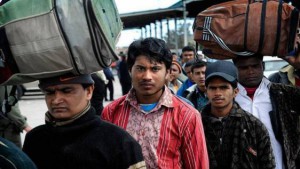Around 20,000 to 25,000 Bangladeshis living in Libya are facing huge security threat.
The Bangladesh embassy in Libya gets reports of three to four abduction incidents almost every week, and in most cases, they negotiate with the abductors to free the victims.
They even had to pay ransom several times to free the embassy staff.
The governments in Tripoli and Benghazi, where most of the Bangladeshis are located, are very fragile. In most of the cases, the administration and the law enforcers do not function properly.
The only embassy
First Secretary of Bangladesh Embassy in Tripoli Mozammel Haque gave a bleak picture of Libya while talking to the Dhaka Tribune.
At present four or five governments operate in Libya, said Mozammel, who has been working in the war-ravaged country for the last two years.
Tripoli is under the control of militia forces while the elected government takes shelter far away from the capital. Another government rules Benghazi while the UN-supported Libyan government operates from Tunisia.
Mozammel said that Bangladesh is the only country to have its mission fully operational in Libya.
“We have an ambassador, four officials and 14 other staff. Other than our embassy, one Indian official is operating from his Tripoli house while one Pakistani official visits the capital occasionally. All countries from the Middle East and Europe, and the UN and other global bodies have closed down their missions in Libya,” he said.
The ambassador said that the all the employees of the Bangladesh Embassy were instructed not to go anywhere except for the office and their houses.
“We are at risk all the time. Our translator was abducted twice and we had to pay ransom to free him,” Mozammel said.
In 2012, the government brought back around 40,000 Bangladeshis from Libya. But later around 20,000 workers were sent to Libya in phases.
Condition of workers
In Libya, Bangladesh has the maximum number of migrant workers. But the economic condition of the country is very poor as most of the business organisations were shut down.
Mozammel said that even two years ago, one could get $1,000 by spending 1,200 dinar but now one has to spend 3,800 dinar to get same amount of dollars.
On an average, a Bangladeshi worker earns 550 to 600 dinar but there is no formal channel to remit the money, he said. “Not only the workers, even the embassy officials cannot send money to their families in Bangladesh.”
He said that the embassy receives three or four abduction news every week and tries to help the victims in the best way possible.
The regular police force does not work in Libya and that is why it is very difficult to get assistance from the Libyan administration.
A large number of Bangladeshis are leaving Benghazi as the situation is very fluid there, he said. Three Bangladeshis were gunned down in Benghazi last month.
“In the last two years, I did not get permission from the Benghazi administration to visit the place,” Mozammel said.
They don’t want to return
Although the Bangladeshis in Libya are living in great misery, they are reluctant to return to Bangladesh.
Mozammel said that he met a Bangladeshi who lost one of his hands. “I told him to go back home, but in reply he said he had spent Tk5 lakh to come here. He will not be able to repay the money if he goes back now.”
In another incident, one worker lost a leg as he jumped off a three-storey building after it caught fire.
“One of our officials met him and told him that the embassy would bear the expenses of his return. But he turned down our request.” He said that he had spent Tk4 lakh to come to Libya.
Crossing the Mediterranean Sea
Many Bangladeshis have been trying to cross the Mediterranean Sea, located between Libya and Italy, to enter Europe for better life.
“This is a very risky journey and we got information from sources that many Bangladeshis were killed while trying to cross the sea,” the ambassador said.
The Italian government has informed the embassy that in 12 months during 2014-15, they had registered 9,997 Bangladeshis reaching the European country through the sea.
“I know a Bangladeshi organisation is trying to send workers to Libya. But given the poor situation here, we tend to believe that they are not coming here for work.
“If they want to come here to go to Europe, then it will be a suicidal decision as it is yet to be known how many Bangladeshis have drowned on the way to Europe,” Mozammel added.



